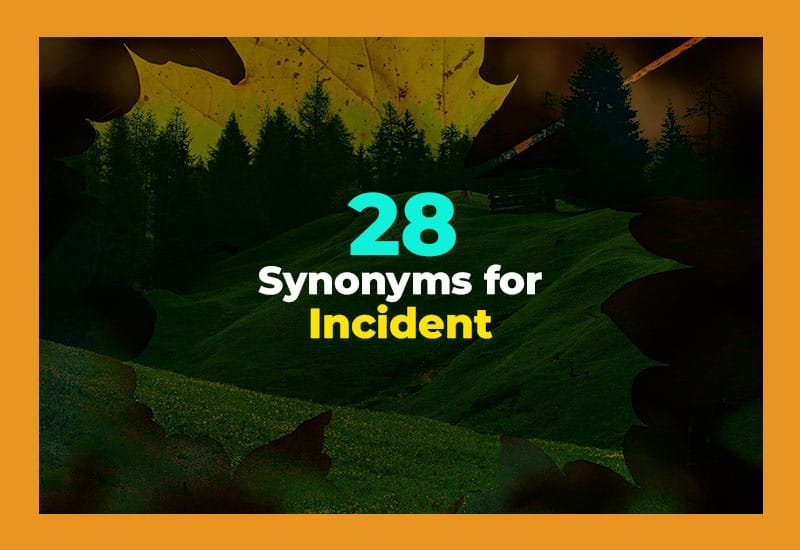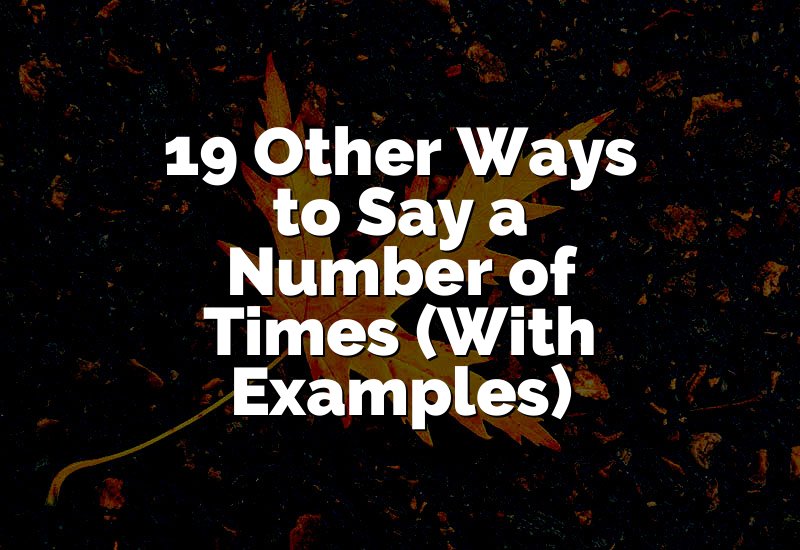An incident is something that happens, often unexpectedly, like an accident, event, or occurrence. We often need simpler words to make our writing or talking clearer. Words like episode, mishap, or situation can replace incident depending on the context. In this article, we will explore 28 easy synonyms for incident with examples so you can use them naturally.
28 Different Ways to Say INCIDENT: Another Word for Incident
Event
An event is a general word for something that happens, usually planned or notable. It works well when you want to describe an incident without suggesting anything bad or good. You can use it for parties, meetings, or public happenings. Event is often used in news, stories, or daily conversations. It's friendly and simple, making it easy for everyone to understand. It relates to incident because every incident is technically an event.
- The concert was the biggest event of the year.
- A strange event occurred in the park yesterday.
- School organizes many events every month.
Occurrence
Occurrence refers to something that happens, especially by chance. It is often neutral and doesn't imply it is positive or negative. You can use occurrence in formal writing, reports, or simple storytelling. It works when you want to talk about an incident in a factual or calm way. Occurrence is related to incident because it highlights the happening itself rather than its effects.
- Rainfall is a common occurrence in April.
- This occurrence surprised everyone in the office.
- There was an unusual occurrence at the bus station.
Happening
Happening is a casual word for something that takes place. It's informal and often used in storytelling or daily conversations. You can use happening to describe incidents that catch attention or are interesting. It is connected to incident because it simply shows that something took place. People often say "strange happening" or "exciting happening" to make it sound friendly.
- A strange happening occurred in the old house.
- The festival had many interesting happenings.
- I love hearing about fun happenings in the city.
Episode
Episode works for incidents that are part of a bigger story or series. You often use it in stories, TV shows, or personal experiences. Episode is perfect when describing one part of several related incidents. It relates to incident because each episode is an individual happening. It makes the event easier to talk about or organize in writing.
- The first episode of the show was amazing.
- That episode in my life taught me a lot.
- There was an episode at work that made everyone laugh.
Situation
Situation refers to the circumstances around an incident. It is useful when you want to explain context or background. It's often used when the incident is tricky, serious, or needs attention. Situation is related to incident because incidents happen in situations, and describing the situation helps others understand better.
- The situation at the office became tense.
- She handled the situation very calmly.
- This situation could have been avoided with planning.
Experience
Experience can describe an incident when you focus on learning or feeling. It works for positive, negative, or neutral incidents. People often use experience when the incident affects them personally. It relates to incident because every incident is a chance to have an experience. It makes the event more personal and memorable.
- Traveling alone was a great experience.
- That experience taught me patience.
- He shared his experience from yesterday's incident.
Case
Case is useful when talking about incidents formally, like in law, medicine, or investigations. It often refers to an example or report of what happened. Case relates to incident because it labels a single event as something to examine or discuss. It works when you want to sound clear and precise.
- The police opened a case about the robbery.
- This is a case of misunderstanding.
- Doctors handled a rare case yesterday.
Affair
Affair is often used for incidents involving personal or public matters. It can mean something serious or a little secret. Affair relates to incident because it focuses on the event and its effect on people. It is often used in news, stories, or casual conversation about notable happenings.
- The affair at the office shocked everyone.
- This affair became the talk of the town.
- They solved the affair quickly.
Adventure
Adventure describes an exciting or unusual incident. It often has a positive or fun feeling. You can use it to describe trips, experiences, or challenges. Adventure relates to incident because it shows that something happened that changed the normal routine. It's great for storytelling or sharing fun experiences.
- Our trip to the mountains was a big adventure.
- That adventure taught me bravery.
- She wrote a book about her adventures abroad.
Circumstance
Circumstance focuses on the conditions around an incident. It is often used to explain why something happened. Circumstance relates to incident because it gives context and meaning to the event. It is useful in conversations, reports, and storytelling.
- Under the current circumstances, we cannot proceed.
- His success came despite difficult circumstances.
- The circumstance of the accident is still unclear.
Occasion
Occasion refers to an incident that happens at a particular time. It is often used for celebrations, events, or special moments. Occasion relates to incident because it labels a happening as memorable or notable. It makes the incident sound positive and special.
- Her birthday is a happy occasion every year.
- The ceremony was a formal occasion.
- They met on a special occasion.
Matter
Matter can describe an incident when discussing a problem or situation. It is often used in conversation or formal writing. Matter relates to incident because it points to the topic or event that needs attention. It is easy to use and widely understood.
- This is a serious matter we need to discuss.
- The matter was resolved quickly.
- He explained the matter clearly to everyone.
Activity
Activity works for incidents involving action or movement. It is often used for sports, school, or work events. Activity relates to incident because it shows something happening that involves people or effort. It's simple and easy to understand.
- Morning activities include exercise and games.
- The school planned several fun activities.
- Cleaning the park was a group activity.
Scene
Scene refers to an incident that people notice or witness. It is often used in storytelling, movies, or crime reports. Scene relates to incident because it highlights the place and moment of the happening. It helps the audience visualize what happened.
- The scene of the accident was chaotic.
- A beautiful scene appeared during sunset.
- That scene in the movie was unforgettable.
Accident
Accident is a synonym used when the incident is unplanned and often harmful. It is common in daily conversation and news. Accident relates to incident because it is a type of incident that people notice immediately. It works best when describing unexpected events.
- She broke her leg in a car accident.
- The accident caused a traffic jam.
- Minor accidents happen all the time at work.
Mishap
Mishap is a friendly way to describe a small or minor incident. It is less serious than an accident and often used in casual conversation. Mishap relates to incident because it represents a small event that caused a problem or surprise.
- A small mishap happened during the picnic.
- The mishap was fixed quickly.
- He laughed at the funny mishap.
Confrontation
Confrontation describes an incident involving conflict or disagreement. It is often serious and noticeable. Confrontation relates to incident because it highlights tension or interaction between people. It works when the incident includes emotions or conflict.
- The confrontation at work was intense.
- He avoided confrontation with his friend.
- That confrontation changed their relationship.
Encounter
Encounter refers to an incident when meeting someone or something unexpectedly. It is often neutral or positive. Encounter relates to incident because it describes a meeting that stands out. It is great for storytelling or casual conversation.
- I had a strange encounter with a dog.
- They shared a brief encounter at the cafe.
- The encounter made her smile.
Conflict
Conflict describes an incident involving disagreement or struggle. It is often used in stories, news, or work situations. Conflict relates to incident because it shows tension or a problem arising. It helps explain why the event matters.
- The conflict between neighbors lasted days.
- They resolved the conflict peacefully.
- Conflict at work can be stressful.
Trouble
Trouble is a casual way to describe a problem incident. It is often negative but simple to understand. Trouble relates to incident because it shows difficulty or unwanted events. It works well in daily conversation or stories.
- She got into trouble at school.
- The car broke down, causing trouble.
- He warned me about possible trouble.
Development
Development refers to an incident when something changes or grows. It is often used in news or stories. Development relates to incident because it shows a happening that changes the situation. It is useful for updates and explanations.
- A new development surprised the town.
- The development in the project was fast.
- Recent developments changed our plans.
Issue
Issue describes an incident when talking about a problem or topic. It is common in work, news, or discussions. Issue relates to incident because it highlights something happening that needs attention. It makes the incident clear and understandable.
- We need to solve this issue quickly.
- The issue caused some delays.
- She raised an important issue in the meeting.
Phenomenon
Phenomenon is used for unusual or notable incidents. It is often scientific, natural, or surprising. Phenomenon relates to incident because it shows something happening that is remarkable. It adds interest when describing an unusual event.
- The northern lights are a beautiful phenomenon.
- That phenomenon surprised scientists.
- People gathered to watch the rare phenomenon.
Action
Action refers to an incident involving doing something. It is often used in stories, movies, or daily life. Action relates to incident because it shows the event itself and what people did. It is simple and lively for storytelling.
- The hero's action saved the day.
- Quick action prevented the accident.
- Every action has a consequence.
Eventuality
Eventuality describes a possible incident that might happen. It is often used in planning or preparation. Eventuality relates to incident because it considers future happenings. It is helpful for caution or forecasting.
- Prepare for any eventuality in life.
- We planned for every eventuality.
- The contract covered all eventualities.
Predicament
Predicament refers to an incident that causes difficulty or trouble. It is often serious or tricky. Predicament relates to incident because it highlights the problem caused by the event. It helps others understand urgency or importance.
- He found himself in a difficult predicament.
- The predicament was solved with help.
- Facing a predicament teaches patience.
Experience
Experience describes an incident when focusing on feelings or learning. It is often personal and reflective. Experience relates to incident because every incident is a chance to learn or feel something new. It makes stories more relatable.
- Traveling gave me a new experience.
- That experience taught her kindness.
- Everyone should try new experiences.
Table of Synonyms for Incident
| Synonym | Example |
|---|---|
| Event | The concert was the biggest event of the year. |
| Occurrence | There was an unusual occurrence at the bus station. |
| Happening | A strange happening occurred in the old house. |
| Episode | That episode in my life taught me a lot. |
| Situation | She handled the situation very calmly. |
| Experience | Traveling alone was a great experience. |
| Case | The police opened a case about the robbery. |
| Affair | The affair at the office shocked everyone. |
| Adventure | Our trip to the mountains was a big adventure. |
| Circumstance | Under the current circumstances, we cannot proceed. |
| Occasion | Her birthday is a happy occasion every year. |
| Matter | This is a serious matter we need to discuss. |
| Activity | Morning activities include exercise and games. |
| Scene | The scene of the accident was chaotic. |
| Accident | She broke her leg in a car accident. |
| Mishap | A small mishap happened during the picnic. |
| Confrontation | The confrontation at work was intense. |
| Encounter | I had a strange encounter with a dog. |
| Conflict | The conflict between neighbors lasted days. |
| Trouble | She got into trouble at school. |
| Development | A new development surprised the town. |
| Issue | We need to solve this issue quickly. |
| Phenomenon | The northern lights are a beautiful phenomenon. |
| Action | The hero's action saved the day. |
| Eventuality | Prepare for any eventuality in life. |
| Predicament | He found himself in a difficult predicament. |

Final Thoughts
I hope this guide helps you use different words for incident naturally. Each synonym has its own tone and context, so choosing the right one makes your writing or speaking clearer. Using words like event, mishap, or occurrence can make your sentences simpler and friendlier. With these 28 options, you can describe incidents easily and make your stories or conversations more engaging and easy to understand.









